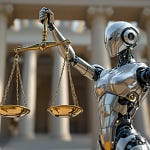Introduction
Through the lens of Stoic philosophy, Cameron's insights on AI and robotics present a fascinating intersection of ancient wisdom and modern technological challenges. Let us analyze this text using key Stoic principles of reason, virtue, and the proper understanding of what lies within and beyond our control.
The Nature of Progress and Control
Cameron's observation about the evolution from simple machines to learning systems reflects what Marcus Aurelius termed the natural progression of things. However, the Stoic perspective would caution us to maintain clear judgment about what truly lies within our control. As Marcus Aurelius wrote, "For all things that are not within the verge of her own operation, are indifferent unto her."
The development of AI and robotics represents human ingenuity, but we must remember that the ultimate outcomes of these technologies, like all external things, are not entirely within our control. The Stoic approach would be to focus on our reasoned choices in developing and implementing these technologies.
Ethical Considerations and Virtue
The ethical concerns Cameron raises about autonomous weapons and AI decision-making align with core Stoic principles about moral responsibility and the pursuit of virtue. The Stoics would particularly appreciate the focus on ethical implications, as they believed that moral character was the only true good.
When Cameron questions whether autonomous platforms should have "kill authority," he touches upon what the Stoics would consider a fundamental question of virtue and wisdom. As Seneca advised, "No evil is great which is the last evil of all." The Stoic perspective would emphasize our moral duty to ensure that our technological creations align with virtuous principles.
The Role of Reason and Wisdom
The discussion of Asimov's Laws of Robotics presents an interesting parallel to Stoic ideas about natural law and rational order. Just as the Stoics believed in a universal rational principle governing all things, these laws attempt to create a rational framework for artificial beings.
However, Marcus Aurelius would likely caution us to remember that "the sum then of all; whatsoever doth happen unto thee, whereof God is the cause, to accept it contentedly: whatsoever thou doest, whereof thou thyself art the cause, to do it justly."
Applications and Societal Impact
The various applications Cameron discusses - healthcare, search and rescue, military - would be viewed by Stoics through the lens of their benefit to the human community. As Marcus Aurelius taught, our actions should aim "to do good unto others, as being that, which by thy natural constitution, as a man, thou art bound unto."
Future Implications and Wisdom
The Stoic approach to the future of AI and robotics would emphasize:
Rational Assessment: Evaluating developments without emotional attachment
Moral Responsibility: Ensuring our technological progress serves virtue
Social Benefit: Focusing on applications that truly benefit humanity
Wisdom in Implementation: Making reasoned choices about how we deploy these technologies
Conclusion
From a Stoic perspective, the key to navigating the challenges of AI and robotics lies not in the technologies themselves, but in our approach to them. As Seneca advised, "Let not things future trouble thee." Instead, we should focus on making virtuous choices in the present moment regarding how we develop and implement these technologies.
The Stoic analysis suggests that while AI and robotics present unprecedented capabilities, our fundamental ethical obligations remain unchanged. We must ensure that these technologies serve human flourishing while maintaining our commitment to wisdom, justice, courage, and self-control.
As Marcus Aurelius would remind us, our task is not to predict the future but to act with virtue in the present: "For whatsoever I do either by myself, or with some other, the only thing that I must intend, is, that it be good and expedient for the public."
This analysis shows that while the technological landscape has changed dramatically since the time of the Stoics, their fundamental principles about reason, virtue, and human responsibility remain powerfully relevant to our modern challenges with AI and robotics.











Share this post